MetX is a production house made for and by musicians. In close collaboration with artists coming from the most different horizons, we create original repertoires and music bands. Our mission is twofold: firstly, we produce and promote groups like Sheikhs Shikhats & B’net Chaabi, BRUiTAL, Remork & Karkaba or Fanfakids. Secondly, we share the repertoires and knowledge of our musicians for others to build on it.
Our acoustic universe integrates elements from both the Western jazz and improvisation culture as from Urban Ethno, traditional music sustained by the different cultures you can find in a metropole like Brussels. Once merged with mutual respect by our musicians, this artistic material can evolve into a completely new musical culture. Sometimes loud, sometimes soft, sometimes beautiful, sometimes ugly. Never smooth. Always exciting.
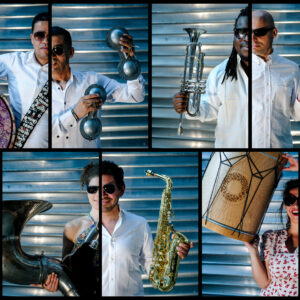
Address
MetX vzw/asbl, Rue De Lenglentierstraat 20 – 1000 Brussels
+32 (0) 2 218 70 52
Facturation coordinates
VAT number BE0422-914-852
Bank account BE60 6352 3577 0170
Rehearsal space for rent
Looking for a space to rehearse in with your group or brass band? MetX places its rehearsal room at the disposal of (Brussels-based) musical projects sharing the social and artistic objectives of our organisation. Contact Delphine Dupont for more info.

MetX (formerly Krijtkring) was founded in 1982.
The foundations of a theatrical school in Nicaragua are laid with subsidies from the then ABOS. Artistic communication between Flemish artists and their peers from ethnic-cultural minorities is central from the outset. Since 1984, some music ensembles with Luc Mishalle have been on the forefront internationally. Belçikal tours both jazz and folk festivals, mainly in Great Britain, Ireland and the Netherlands. A few years later, Rai Express surfs on the raï wave (Cheb Khaled et al.). The group tours extensively in Germany and Austria, and occasionally in France and the Netherlands.
Since 1990, the emphasis has also been on an unorthodox form of pop-oriented music education: De Krijtkring coordinates within the structure of Antwerp ’93 the much-discussed project ‘Reisduiven en Kleurpotloden’. The 18-strong youth orchestra Marakbar is the result of a large selection of Moroccan music workshops.
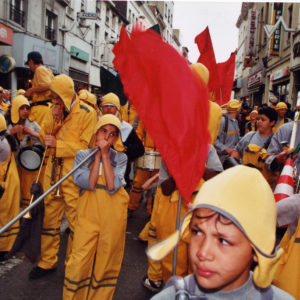
With Al-Harmoniah (a large saxophone orchestra with Moroccan percussionists, in co-production with the Beursschouwburg and Blindman!), the movement is extended to Brussels. Al-Harmoniah becomes cultural ambassador of Flanders in 1998 and tours extensively in Morocco. That same year, the group plays with the famous Orchestre National de Barbes in prestigious venues in London, Metz, Nijmegen and the Brussels’ AB. In 1999, the Krijtkring receives the first structural grant from the Flemish Community as a music educational association.
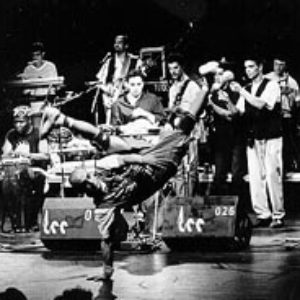
Brussels 2000 is essential for a new increase in scale. A team of musicians not only develops the official opening ceremony on the Brussels’ Grote Markt, but also raises the eyes with a Drum & Brass affair, in which 7 international formations from the alternative hafabra world play along. Subsequently, Luc Mishalle is artistic coordinator of the north-eastern pole of the Zinneke Parade. In the wake of that parade, the successful out-and-out groups Fanfarrah and Fanfakids emerge.
The Krijtkring will receive additional funding from the Flemish Community and the non-profit association will move to the Bottelarij (also the interim home of the KVS) in Molenbeek. That move colors our work: we start working intensively together with the gnawa musicians of Ouled Bambara, and with the Rwandan group Inyange.
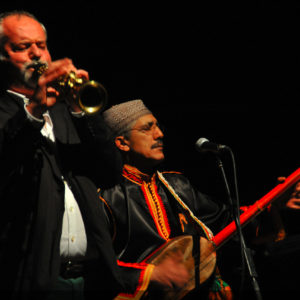
At the same time mega spectacles are realized for Ode Gand and in Antwerp we produce the Hop Frog fanfare and ‘Gekelderd’. There are also groups with a very professional appearance: Marockin ‘Brass, Saxafabra (i.s.m. jazzlab) and Aywa! (co-production Zuiderpershuis). We work and tour twice in Morocco. The Fanfakids also travel to Morocco and Ghana. In Molenbeek we create music theater with Moeufs Marinées, a co-production with the KVS.
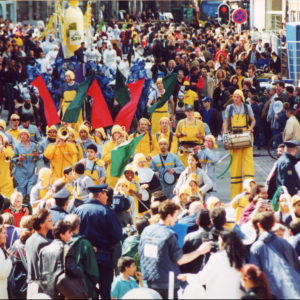
In 2007 Inyange Beat Orchestra won the VGC prize ‘Gouden Ketje’ for culture and the Krijtkring was transformed into MetX. The organization is growing fast: more workshops, more concerts and a three-year curatorship for Luc Mishalle at Stadsvisioenen in Mechelen.
The 2010-11 season is a great year: we play more than 120 concerts with groups that are the result of an intensive educational process. Around that time we also start singing projects: Shanti! Shanti! and VoiXlà !, which will later turn into Stemagnifique. Groups such as Remork and VelotroniX are started up. More recently, Marockin ‘Brass plays a jazzlab tour with her project’ Byron Wallen ‘.
MetX is also internationally at the forefront: between 2007 and 2013 we play the whole of Europe with the European Saxophone Ensemble. Via Marockin ‘Brass and later with Brassafrik we set up projects in Burkina Faso and Ghana. VelotroniX goes to Kinshasa twice. We are frequently consulted by a wide range of very diverse organizations, both at home and abroad.
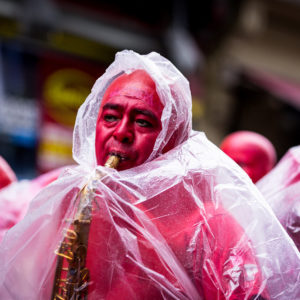
The curating of large city and other events continues to demand our attention: after all, METX systems and productions are being used on a large scale. Mega-orchestras will be performing on the Zinneke Parade, a collaboration with Fabrizio Cassol on the First Night of the Klarafestival, a theatrical verse from ‘in C’ (Terry Riley) for ‘1000 years of St Guido’ and an Oxfamafare on the Gentse Feesten.
We can without any hesitation state that the artistic level is high, that the collaborations are strong and that the team is tight. The productions are original and are on the big stages and the better festivals, but at the same time they are prominently present at neighborhood parties, social-artistic events, etc.
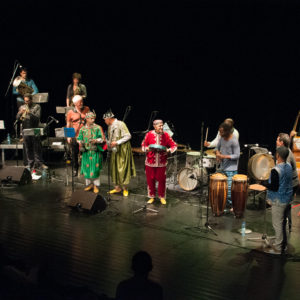
In 2016, Mâäk and MetX became one organsation. Mâäk has of course a separate history:
What once started as an urban legend under the slogan “MÂÄK”, grew into a jazz collective with various branches and links that now reach all over Europe and even to a large part of Africa.
Twenty years ago, trumpeter Laurent Blondiau (° 1968) gathered a number of musicians around him to work out his vision and ideas about jazz. Immediately his favorite exclamation “MÂÄK” was transformed into the group name Mâäk’s Spirit. Tenor saxophonist Jeroen Van Herzeele was there from the very beginning and remained a fixed value to date.
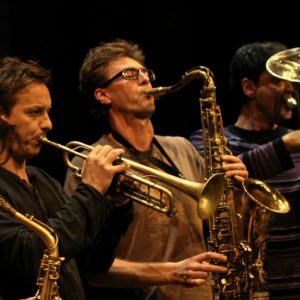
A first CD (‘… LIVEs …’, 1998) was recorded live in the jazz club Den Turk, then with Salvatore La Rocca (double bass) and Hans Van Oosterhout (drums). “Intelligent and passionate music arranged in short themes and open forms, often with a great deal of liberty for the musicians, free-wheeling and lightly exorcing” was read on the cover. Two decades later, the music of Mâäk is still grafted on the same properties. It is true that the approach has been deepened in depth over the years and has been greatly enriched.
The discography of Mâäk (the addendum Spirit disappeared over time) now counts ten CDs, the most recent of which received the title ‘MwSOUL‘. It became a collaboration with the Tunisian singer Ghalia Benali. A striking musical statement marked by a social and spiritual message, elements that remain the main theme at Mâäk.
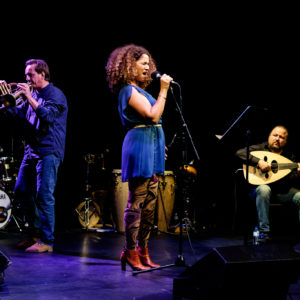
The rapprochement with other musical movements and influences were always of paramount importance. That became clear with the second CD ‘Le Nom Du Vent’ (2002), when Michel Massot, Jean-Yves Evrard, Eric Thielemans and Otti Van der Werf joined the ranks next to Blondiau and Van Herzeele. It was also a first acquaintance with North Africa, more specifically with the Gnawa culture from Morocco. That connection was continued on ‘Al Majmaâ‘ (2004), in which the trance aspect was enlarged. From there it went to South Africa where they visited the company of local poets Kgafela Oa Magogodi and Samantha7, to be heard on ‘Stroke’ (2008). In Mali they crossed the path of Sekouba Traoré and the Bambara hunters and together set up the project ‘Djekoulou‘.
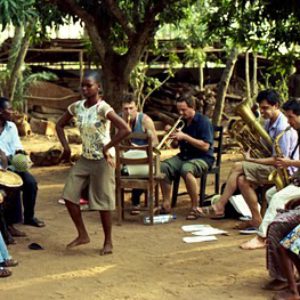
Under the name ‘Il n’y a pas de Fraises en Hiver‘ musicians from Mâäk started making music in the most surprising corners of Brussels. The tour took them from laundromats and train stations to the local butcher and even various street corners. Completely original and unusual, as always according to the Mâäk principles. This begged for more and Blondiau went with Jean-Yves Evrard, Sébastien Boisseau, Jean Chevalier and lightman Sam Mary to Avignon, Lisbon but also to Bamako and Timbuktu with the same scenario: playing in totally unexpected places. A video of this will appear in the course of 2018.
